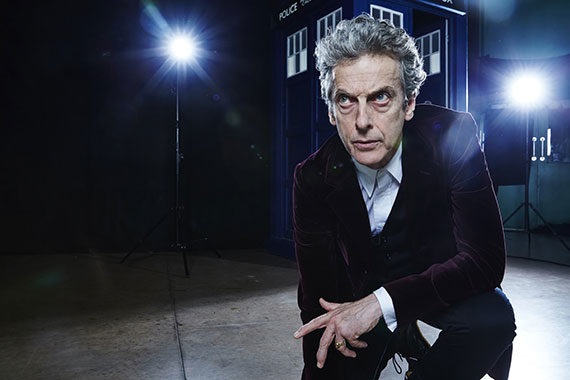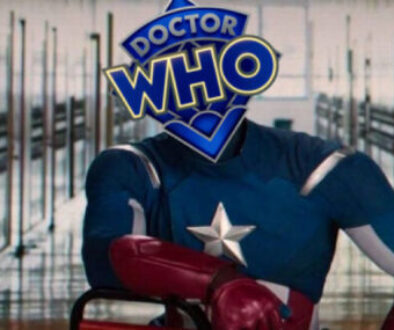Is Doctor Who’s Family Audience Appeal Holding It Back?
Connor Johnston wonders if the show’s requirement to appeal to a family audience is a hindrance.

It’s been just short of 52 years since a simple sci-fi TV show premiered on the BBC aimed at encompassing the affections and imaginations of entire families – from the youngest of children to the oldest of adults and every pre-pubescent humanoid in between. This show HAD to have an aspect to appeal to everyone from all walks of life – an impossible brief, but one Doctor Who somehow rose to overcome effortlessly. Since the 1960’s the way audiences watch television and what they demand from programs to survive has changed dramatically. Over these 52 years Doctor Who has constantly adapted to meet the needs of modern audiences to not only survive, but thrive as one of the most popular programs of all time. Today however, I plan on exploring whether or not another drastic transformation is required to continue to be the booming success that it’s been in the in the last decade.
 It’s no secret that since its return in 2005, many of the more critically acclaimed episodes of Doctor Who have embodied an admittedly darker and more mature tone. We need only look to fan favourites like “The Empty Child”, “Blink”, “The Family of Blood”, “Listen” and the recently praised “The Magician’s Apprentice / The Witch’s Familiar” to see how Doctor Who audiences crave and revel in darkness and horror. The use of fear and obscure themes have been implored in Doctor Who from almost the very beginning, with the introduction of the Daleks in the second televised story back in the 1963. However it’s become progressively clearer in the last 2-3 years especially that the themes and plots Doctor Who are attempting to tackle are becoming more mature in nature.
It’s no secret that since its return in 2005, many of the more critically acclaimed episodes of Doctor Who have embodied an admittedly darker and more mature tone. We need only look to fan favourites like “The Empty Child”, “Blink”, “The Family of Blood”, “Listen” and the recently praised “The Magician’s Apprentice / The Witch’s Familiar” to see how Doctor Who audiences crave and revel in darkness and horror. The use of fear and obscure themes have been implored in Doctor Who from almost the very beginning, with the introduction of the Daleks in the second televised story back in the 1963. However it’s become progressively clearer in the last 2-3 years especially that the themes and plots Doctor Who are attempting to tackle are becoming more mature in nature.
 Peter Capaldi’s tenure specifically has seen a darker ambition infect its storytelling; with Series 8 exploring the themes of suicide, unmotivated murder, war and most controversially life after death, as well as Series 9 already dealing with the immeasurable moral dilemma of killing a child who would grow up to be responsible for the death of millions. If global reception is anything to judge a show’s success on, it’s clear that these darker and riskier paths are faring fruitfully with both the teenage/adult fanbase and critics alike. This logic poses the question that if Doctor Who eliminated its responsibility to appeal to the entire family and wasn’t restricted by its duty to safeguard and cater for its younger audiences, could making the jump to becoming an even more gritty, mature drama targeting an exclusively mature demographic boost the show’s popularity further and cement its survival for years to come? Essentially: Is the show’s younger audience holding it back?
Peter Capaldi’s tenure specifically has seen a darker ambition infect its storytelling; with Series 8 exploring the themes of suicide, unmotivated murder, war and most controversially life after death, as well as Series 9 already dealing with the immeasurable moral dilemma of killing a child who would grow up to be responsible for the death of millions. If global reception is anything to judge a show’s success on, it’s clear that these darker and riskier paths are faring fruitfully with both the teenage/adult fanbase and critics alike. This logic poses the question that if Doctor Who eliminated its responsibility to appeal to the entire family and wasn’t restricted by its duty to safeguard and cater for its younger audiences, could making the jump to becoming an even more gritty, mature drama targeting an exclusively mature demographic boost the show’s popularity further and cement its survival for years to come? Essentially: Is the show’s younger audience holding it back?
 A key factor that encouraged this discussion is the fact that the third episode of Series 9, “Under the Lake,” will be broadcast at the irregularly later timeslot of 8:25pm to 9:10pm this weekend. The mundane justification for this schedule is due to the increased running time of Strictly Come Dancing, but it also could be due to the fact the episode has been deemed too dark or disturbing for younger viewers – as was similarly ruled by the presence of the Mummy in last year’s “Mummy on the Orient Express” which aired at an even later 8:35pm. What a later running time allows is for Doctor Who to test the waters with its content without the burden of an earlier timeslot, as well as aiding it in naturally establishing a darker atmosphere. It’s for this reason I’d support the rest of the series adapting a similarly later timeslot. Now of course iPlayer and recordings offer solace for families to watch the show together if the later time did impact their children’s viewing patterns – as well as also offering parents a chance to make individual judgements on what is appropriate content for their own children, as making general assumptions based on age groups is simply too hard a task to master. It’s a move that promotes convenience and a chance for the show to experiment more in murkier waters.
A key factor that encouraged this discussion is the fact that the third episode of Series 9, “Under the Lake,” will be broadcast at the irregularly later timeslot of 8:25pm to 9:10pm this weekend. The mundane justification for this schedule is due to the increased running time of Strictly Come Dancing, but it also could be due to the fact the episode has been deemed too dark or disturbing for younger viewers – as was similarly ruled by the presence of the Mummy in last year’s “Mummy on the Orient Express” which aired at an even later 8:35pm. What a later running time allows is for Doctor Who to test the waters with its content without the burden of an earlier timeslot, as well as aiding it in naturally establishing a darker atmosphere. It’s for this reason I’d support the rest of the series adapting a similarly later timeslot. Now of course iPlayer and recordings offer solace for families to watch the show together if the later time did impact their children’s viewing patterns – as well as also offering parents a chance to make individual judgements on what is appropriate content for their own children, as making general assumptions based on age groups is simply too hard a task to master. It’s a move that promotes convenience and a chance for the show to experiment more in murkier waters.
 To truly reach the crux of this debate, it’s important to look outside of the show itself. Over the last few years, the rising popularity of mature and particular graphic dramas have moulded and changed what audiences look for in the shows they watch. Notable mentions such as “Game of Thrones”, “Breaking Bad”, “Broadchurch” and “The Walking Dead” prove that for television shows to acquire the global presence of an modern day international phenomenon they need a certain list of characteristics: mystery, mature themes, consequence, brutality and death. For Doctor Who to continue to survive for as long as it has it has to recognise that what global audiences seek has change and catering to a constantly altering pool of demands is no easy feat.
To truly reach the crux of this debate, it’s important to look outside of the show itself. Over the last few years, the rising popularity of mature and particular graphic dramas have moulded and changed what audiences look for in the shows they watch. Notable mentions such as “Game of Thrones”, “Breaking Bad”, “Broadchurch” and “The Walking Dead” prove that for television shows to acquire the global presence of an modern day international phenomenon they need a certain list of characteristics: mystery, mature themes, consequence, brutality and death. For Doctor Who to continue to survive for as long as it has it has to recognise that what global audiences seek has change and catering to a constantly altering pool of demands is no easy feat.
 I don’t believe that it’s too out there to assume that the majority of Doctor Who audiences have grown up with the show throughout their childhood, be it with the Classic or revived series, and as such a certain level of nostalgia has formed that would keep the show afloat to a certain extent even without the constant reinvention. Luckily enough however, with almost every new series comes a feeling of rejuvenated storytelling that keeps the show exciting and viewers enthralled. This point aside, the fact that its audiences are growing up cannot be ignored, and though not incredibly vocal there is a section of fans that may feel, despite the efforts of recent series, that the show isn’t growing up with them. It’s a concept that was executed brilliantly by her majesty J.K. Rowling (Praise her) with both the Harry Potter book and movie series that saw the format and the tone of her story not only mature alongside the main character, but also alongside the reader. The question is has Doctor Who evolved enough over the last few series to capture it’s ripening audiences to the same success that it did in their youth? And, if not, can it be possible to do so without sacrificing an entire younger section of its fan base.
I don’t believe that it’s too out there to assume that the majority of Doctor Who audiences have grown up with the show throughout their childhood, be it with the Classic or revived series, and as such a certain level of nostalgia has formed that would keep the show afloat to a certain extent even without the constant reinvention. Luckily enough however, with almost every new series comes a feeling of rejuvenated storytelling that keeps the show exciting and viewers enthralled. This point aside, the fact that its audiences are growing up cannot be ignored, and though not incredibly vocal there is a section of fans that may feel, despite the efforts of recent series, that the show isn’t growing up with them. It’s a concept that was executed brilliantly by her majesty J.K. Rowling (Praise her) with both the Harry Potter book and movie series that saw the format and the tone of her story not only mature alongside the main character, but also alongside the reader. The question is has Doctor Who evolved enough over the last few series to capture it’s ripening audiences to the same success that it did in their youth? And, if not, can it be possible to do so without sacrificing an entire younger section of its fan base.
Considering all I have done today it falls to me to ask whether or not it truly is time for Doctor Who to re-evaluate its genre, and possibly strive away from appealing to entire families and further narrow its projection to a more mature audience. Bearing in mind all that I explored through today’s discussion, I think it’s fairly safe to say (however ironic it may seem)… no.
 If anything, today’s debate has only reaffirmed what a unique and prosperous success story Doctor Who has become. The beauty of Doctor Who is the balance that it achieves tonally to cater for all types of audiences, and how just as true as it was in 1963, 52 years later it still has the impossible ability to appeal to a range of age groups and maturities simultaneously. While not rivalling shows like “Game of Thrones” and “The Walking Dead” in terms of gore or mature drama, Doctor Who has more than enough going for it; through its history and constantly evolving format. Its popularity at time seems effortless – and that because while other shows may be seasonally “the in-thing” – be it through their use of comedy, action, superheroes or dark gritty drama: Doctor Who encompasses all and its entrance is truly timeless.
If anything, today’s debate has only reaffirmed what a unique and prosperous success story Doctor Who has become. The beauty of Doctor Who is the balance that it achieves tonally to cater for all types of audiences, and how just as true as it was in 1963, 52 years later it still has the impossible ability to appeal to a range of age groups and maturities simultaneously. While not rivalling shows like “Game of Thrones” and “The Walking Dead” in terms of gore or mature drama, Doctor Who has more than enough going for it; through its history and constantly evolving format. Its popularity at time seems effortless – and that because while other shows may be seasonally “the in-thing” – be it through their use of comedy, action, superheroes or dark gritty drama: Doctor Who encompasses all and its entrance is truly timeless.
While it is important for Doctor Who to continue to mature and grow in its themes, I’d only endorse it doing so in the way that it is currently – without discriminating against an entire generation by not allowing them too to grow up with Doctor Who while still keeping its older audiences hooked and excited – just as it has done constantly for almost 52 years. It’s a method that I believe Series 9 with the possibility of its later timeslot and hopefully electrifying storylines is on track to execute perfectly.








